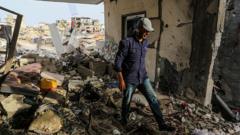The World Food Programme (WFP) has confirmed that its last food stocks in Gaza have been delivered, leaving the territory facing severe shortages amid a seven-week blockade by Israel. The situation has heightened food prices and worsened malnutrition among vulnerable populations. The UN calls on all parties to allow humanitarian aid to enter Gaza, while Israel maintains that it is complying with international law.
Humanitarian Crisis Deepens in Gaza as Food Aid Supply Dries Up Amidst Israeli Blockade

Humanitarian Crisis Deepens in Gaza as Food Aid Supply Dries Up Amidst Israeli Blockade
The World Food Programme has announced it has fully depleted its food stocks in Gaza due to a prolonged blockade by Israel, exacerbating the humanitarian crisis in the region.
The article text:
The UN World Food Programme (WFP) has announced that it has exhausted all its food supplies in Gaza, where an Israeli blockade has persisted for seven weeks, leading to a dire humanitarian crisis. "Today, WFP delivered its last remaining food stocks to hot meals kitchens," the agency stated, warning that these kitchens will run out of food within days.
Israel cut off humanitarian aid on March 2, resuming its military offensive two weeks later following the collapse of a temporary ceasefire, asserting the need to pressure Hamas to release remaining hostages. According to the UN, Israel has a legal obligation to ensure that sufficient resources are provided for the 2.1 million Palestinians residing in Gaza, while the Israeli government claims it is upholding international law and denies any aid shortage.
By the end of March, all 25 bakeries supported by WFP in Gaza had ceased operations due to a lack of wheat flour and cooking fuel. Furthermore, food parcels with two weeks' worth of rations have been fully delivered. The UN Office for the Coordination of Humanitarian Affairs (OCHA) has indicated that there are critical shortages of medicine and medical supplies, with hospitals becoming overwhelmed by the casualties resulting from ongoing Israeli strikes. Fuel shortages are also obstructing water production and distribution.
WFP noted that the current blockade represents the longest closure Gaza has ever faced, exacerbating fragile markets and food systems. Prices of essential commodities surged by up to 1,400% compared to previous levels during the ceasefire, raising severe nutrition risks for at-risk groups, such as children under five, pregnant and breastfeeding women, and the elderly. The hot meal kitchens, while crucial, currently serve only half the population and account for just 25% of daily food needs.
"The situation inside the Gaza Strip has reached a critical point," WFP stated, emphasizing that without immediate action to permit aid and trade through the borders, its essential assistance may soon cease. The agency has urged all parties to prioritize civilian needs and allow the immediate entry of humanitarian aid, in line with their obligations under international humanitarian law.
More than 116,000 tonnes of food aid, capable of feeding one million people for four months, await delivery at aid corridors, contingent on the reopening of Gaza's border crossings. In an official statement earlier this week, the Israeli foreign ministry rejected critiques of the blockade from countries including the UK, France, and Germany, dubbing their concerns "intolerable" and reaffirming that no aid shortage exists in Gaza. The ministry asserted that over 25,000 trucks carrying nearly 450,000 tonnes of aid were delivered during the ceasefire period.
The Israeli foreign ministry also contended that it is not obligated to permit aid influx due to concerns that Hamas has "hijacked" supplies to bolster its military operations. Hamas has denied these allegations, and the UN stated that it has maintained "a very good chain of custody" for all assistance it has provided.
Last week, Hamas rejected an Israeli ceasefire proposal that required disarmament in exchange for a hostilities pause and the release of some hostages. Hamas reiterated its stance of returning all hostages only upon a complete cessation of warfare and a full Israeli withdrawal.
Following an unprecedented cross-border assault on October 7, 2023, where approximately 1,200 individuals were reported killed and 251 taken hostage, Israel has launched a military offensive aimed at dismantling Hamas. According to the Hamas-run health ministry in Gaza, at least 51,439 individuals have lost their lives since the inception of this conflict.
The UN World Food Programme (WFP) has announced that it has exhausted all its food supplies in Gaza, where an Israeli blockade has persisted for seven weeks, leading to a dire humanitarian crisis. "Today, WFP delivered its last remaining food stocks to hot meals kitchens," the agency stated, warning that these kitchens will run out of food within days.
Israel cut off humanitarian aid on March 2, resuming its military offensive two weeks later following the collapse of a temporary ceasefire, asserting the need to pressure Hamas to release remaining hostages. According to the UN, Israel has a legal obligation to ensure that sufficient resources are provided for the 2.1 million Palestinians residing in Gaza, while the Israeli government claims it is upholding international law and denies any aid shortage.
By the end of March, all 25 bakeries supported by WFP in Gaza had ceased operations due to a lack of wheat flour and cooking fuel. Furthermore, food parcels with two weeks' worth of rations have been fully delivered. The UN Office for the Coordination of Humanitarian Affairs (OCHA) has indicated that there are critical shortages of medicine and medical supplies, with hospitals becoming overwhelmed by the casualties resulting from ongoing Israeli strikes. Fuel shortages are also obstructing water production and distribution.
WFP noted that the current blockade represents the longest closure Gaza has ever faced, exacerbating fragile markets and food systems. Prices of essential commodities surged by up to 1,400% compared to previous levels during the ceasefire, raising severe nutrition risks for at-risk groups, such as children under five, pregnant and breastfeeding women, and the elderly. The hot meal kitchens, while crucial, currently serve only half the population and account for just 25% of daily food needs.
"The situation inside the Gaza Strip has reached a critical point," WFP stated, emphasizing that without immediate action to permit aid and trade through the borders, its essential assistance may soon cease. The agency has urged all parties to prioritize civilian needs and allow the immediate entry of humanitarian aid, in line with their obligations under international humanitarian law.
More than 116,000 tonnes of food aid, capable of feeding one million people for four months, await delivery at aid corridors, contingent on the reopening of Gaza's border crossings. In an official statement earlier this week, the Israeli foreign ministry rejected critiques of the blockade from countries including the UK, France, and Germany, dubbing their concerns "intolerable" and reaffirming that no aid shortage exists in Gaza. The ministry asserted that over 25,000 trucks carrying nearly 450,000 tonnes of aid were delivered during the ceasefire period.
The Israeli foreign ministry also contended that it is not obligated to permit aid influx due to concerns that Hamas has "hijacked" supplies to bolster its military operations. Hamas has denied these allegations, and the UN stated that it has maintained "a very good chain of custody" for all assistance it has provided.
Last week, Hamas rejected an Israeli ceasefire proposal that required disarmament in exchange for a hostilities pause and the release of some hostages. Hamas reiterated its stance of returning all hostages only upon a complete cessation of warfare and a full Israeli withdrawal.
Following an unprecedented cross-border assault on October 7, 2023, where approximately 1,200 individuals were reported killed and 251 taken hostage, Israel has launched a military offensive aimed at dismantling Hamas. According to the Hamas-run health ministry in Gaza, at least 51,439 individuals have lost their lives since the inception of this conflict.



















